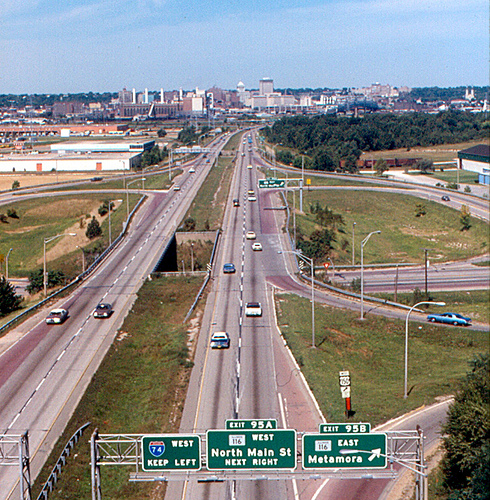Ailing infrastructure: do we lack funding, or just leadership?

Image from Roger.
Transportation Secretary Anthony Foxx is hopeful that politicians can agree on long-term infrastructure funding. “I think there is a moment that is shaping up here for something good can happen,” Foxx said in a speech to the American Association of State Highway and Transportation Officials in Washington. “It needs to be a long-term bill that really meets the needs of a growing 21st America,” he said, according to blog The Hill.
Foxx was speaking to state transportation officials while Senate politicians were holding a hearing on the renewing the $11 billion funding package Congress approved for infrastructure last summer.
Yet more money alone won’t help the country’s dilapidated infrastructure. While increased funds can help build, for example, new transit or new high-speed rail, as Streetsblog reports, state departments of transportation, the agencies responsible for spending federal funds, are not spending money wisely.
Streetsblog’s Angie Schmitt concluded that “throwing more money at the problem overlooks the fatal flaw in American transportation infrastructure policy: The system is set up to funnel the vast majority of spending through state departments of transportation, and those agencies have an absolutely terrible track record when it comes to making smart long-term decisions.” Why? Because the current, bewailed status of our country’s infrastructure is due to previous “wasteful spending choices,” rather than a lack of money.
Consider Minnesota’s DOT, which, of a $1.9 billion total transportation budget for 2013, spent $1.1 billion on new construction, just $700 million on maintenance, and $143 million on transit. More generally speaking: From 2004 to 2008, states used most of their allotted funds, 57%, on new construction; they used the remaining 43% to maintain the existing 98.7% of road infrastructure.
Had they “spent $20.4 billion annually on repair rather than expansion, they could have cut the number of roads in poor condition in half by 2011—and been on target to eliminate the backlog of roads in poor condition by 2014,” reports Smart Growth America.
Supplying these departments with more funds will merely add to the problem; as Streetsblog puts it, “giving agencies license to spend lavishly on new projects that serve only to increase their massive maintenance backlogs.” Some of those projects include: the ridiculously expensive $2 billion underground highway being developed in Seattle to replace the Alaskan Way Viaduct, a critically unstable elevated highway.
A cheaper option would have been to knock down the Viaduct and replace it with an at-grade boulevard and improved transit alternatives, suggests StreetsBlog. Then there’s Ohio’s $1.4 billion highway linking to the suburbs, which will increase suburban sprawl but is being built “despite widespread opposition from the communities it’s supposed to serve.” Most states can contribute their own version of these questionable budget decisions.
While states may have a say in how to spend the money, if incoming chairman of the Environment and Public Works Committee Sen. James M. Inhofe has anything to do with it, they won’t have be responsibility for raising it. With last summer’s transportation budget extension looming, set to expire May 31, the chairman is aiming to prevent states from taking on the financial burdens of transportation.
Decrying “devolution, the belief that states ought to raise and spend their own transportation funds, rather than funneling federal gas tax dollars through Washington,” he recently said that he wants to avoid yet another funding extension (there have been 32 in the last six years) and to have a bill delivered to the president before funding runs out at the end of May, according to the Washington Post.
Passing a bill sooner rather than later will impact states’ construction projects — for better or for worse, depending on how one views such projects as the pricey Seattle underground highway. “Timing becomes critical, because funding will expire in May just as the construction season gets underway in cold-weather states. Officials in those states say they need the reassurance of a long-term funding plan as they contemplate projects that would take years to complete,” reports the Post.
Related Posts
Category: Infrastructure

















